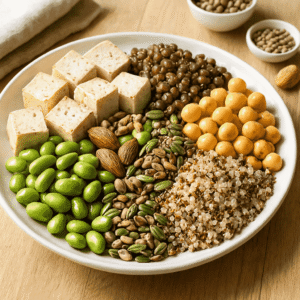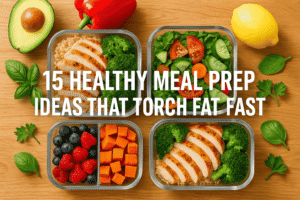Introduction to a Plant-Based Diet
In recent years, the plant based diet has gained a lot of attention—and for good reason. It’s not just a passing trend or a celebrity-driven fad; it’s a powerful way to nourish your body, protect the planet, and feel better inside and out. Whether you’re looking to improve your overall health, shed some weight, prevent chronic diseases, or simply eat more mindfully, going plant-based could be the answer.
A plant-based diet focuses on foods that come from plants—think fruits, vegetables, whole grains, legumes, nuts, and seeds. It doesn’t mean you have to be 100% vegan or give up all animal products overnight. Instead, it’s about filling your plate with more plant goodness and less processed or animal-based food. It’s flexible, simple, and incredibly effective.
Let’s take a deep dive into the 10 amazing health benefits of following a plant-based diet—and see why millions are making the switch!
1. Enhances Heart Health
Your heart works 24/7 for you, and what you eat can either help it thrive or burden it.A plant-based diet is a powerful way to support and protect your heart.
Lowers Bad Cholesterol Naturally
Many people suffer from high cholesterol due to diets high in saturated fats, mostly from animal products. By cutting down on red meat and dairy and replacing them with fiber-rich plant foods, you can lower LDL (bad) cholesterol levels. Foods like oats, beans, avocados, and nuts are known to help reduce cholesterol and support better heart function.
Maintains Healthy Blood Pressure
High blood pressure is a silent killer. But here’s the good news: eating more fruits and vegetables especially leafy greens, beets, and berries—can help lower blood pressure naturally.
These foods are rich in potassium and natural nitrates that help relax your blood vessels and boost blood flow.
2. Supports Weight Management
Trying to lose weight without starving yourself? A plant-based diet offers a natural and effortless approach to staying fit and healthy.
Low in Calories, High in Nutrients
Plant-based meals are generally less calorie-dense but rich in fiber, water, and nutrients. This means you can eat larger portions and still lose weight. No more counting every calorie or feeling deprived!.
Reduces Cravings
Whole plant foods help regulate your hunger hormones and stabilize blood sugar, which makes it easier to avoid junk food cravings. Ever notice how a bowl of lentils keeps you full for hours, but a burger leaves you hungry soon after?
3. Helps Prevent and Manage Type 2 Diabetes
Diabetes is becoming more common, but diet plays a major role in both prevention and management.
Better Blood Sugar Control
Eating whole grains, legumes, and vegetables can help keep your blood sugar levels stable. These foods have a low glycemic index, so they release sugar slowly into the bloodstream, avoiding spikes and crashes.
Improves Insulin Sensitivity
A plant-based lifestyle is often linked to better insulin response in the body. This means your body can use insulin more effectively, reducing the risk of developing type 2 diabetes or making it easier to manage if you already have it.
4. Improves Digestive Health
A healthy gut is essential for your overall well-being—and plants play a big role in keeping your digestive system happy.
Packed with Natural Fiber
Soothes Digestive Issues
If you struggle with constipation, bloating, or IBS, a plant-based diet can help ease symptoms. Foods like bananas, oats, chia seeds, and leafy greens are gentle on the stomach and support better digestion.
5. Strengthens the Immune System
Antioxidants and Vitamins Galore
A Healthier Gut Equals a Stronger Immune System
Surprisingly, about 70% of your immune system is actually housed in your gut? Eating a plant-based diet supports a diverse microbiome—your army of good bacteria that fights off bad germs.
6. Gives You Glowing, Clearer Skin
Reduces Inflammation
Nourishes Your Skin from Within
Vitamins, antioxidants, and hydration from fruits and veggies work together to keep your skin soft, elastic, and youthful. Carrots, sweet potatoes, and berries are especially great for skin health.
7. Boosts Energy Levels
No More Food Comas
Rich in Complex Carbs
Foods like brown rice, quinoa, and sweet potatoes give your body slow-burning fuel that keeps you going strong all day long.
8.Boosts Brain Health and Mental Clarity
Your food choices can influence not only your physical health but also how you think and feel.
Enhances Cognitive Function
Nutrient-rich plant foods containing healthy fats, antioxidants, and essential vitamins support brain health. Omega-3s found in chia seeds, flaxseeds, and walnuts have been shown to support memory and help reduce brain fog.
Reduces Risk of Cognitive Disorders
Scientific studies suggest that diets centered on plant-based foods may lower the chances of cognitive decline and conditions like Alzheimer’s. Foods such as leafy greens, berries, and whole grains help protect brain cells and combat inflammation.
9. Supports a Longer, Healthier Life
Lowers Risk of Chronic Diseases
Conditions such as cancer, kidney disease, and heart problems are often connected to dietary habits. Shifting toward a plant-based lifestyle may help reduce the likelihood of these illnesses, giving you a chance at a more vibrant, active life.
Inspired by the World’s Healthiest Communities
The Blue Zones—regions with the highest numbers of long-lived individuals—typically follow plant-heavy diets. These regions show lower rates of disease and a higher number of active, healthy older adults.
10. Kind to the Environment
Reduces Environmental Impact
Raising animals for food is a major source of greenhouse gases, deforestation, and water contamination. Switching to more plant-based meals significantly cuts down your carbon footprint.
Conserves Water and Natural Resources
It takes over 1,800 gallons of water to produce a single pound of beef, while plant foods like vegetables and legumes require much less. Opting for plant-based foods is a smarter and more eco-friendly way to use natural resources.
Conclusion
A plant-based diet goes beyond just shedding pounds or following a trend—it’s a powerful way to boost your overall health, mood, and environmental impact. Whether you go fully plant-based or simply start including more plant foods in your meals, every positive change matters. You’ll notice improvements in how you feel physically, mentally, and emotionally.
Why not start today? Choosing more plants is a small step that leads to a healthier you and a better world.
FAQs
Can children safely follow a plant-based diet?
Yes, children can thrive on a well-balanced plant-based diet, as long as they receive key nutrients like protein, healthy fats, iron, and vitamin B12 through a variety of foods.
Can I gain muscle while eating plant-based?
Absolutely. Many professional athletes and bodybuilders follow plant-based diets. To support muscle growth, eat plenty of legumes, tofu, quinoa, tempeh, and consider plant-based protein supplements.
How can I get enough protein from plants?
Plant protein is widely available. Combine foods like beans, lentils, seeds, nuts, and whole grains across your meals to meet your daily protein requirements. It’s easier than you think. Combine different plant sources like beans, lentils, nuts, seeds, and grains throughout your day to meet your protein needs.
Will I stay full on a plant-based diet?
What should I avoid on a plant-based diet?
Try not to rely heavily on processed vegan foods. Instead, focus on whole, natural foods and ensure you’re getting essential nutrients like iron, B12, omega-3s, and sufficient calories.




